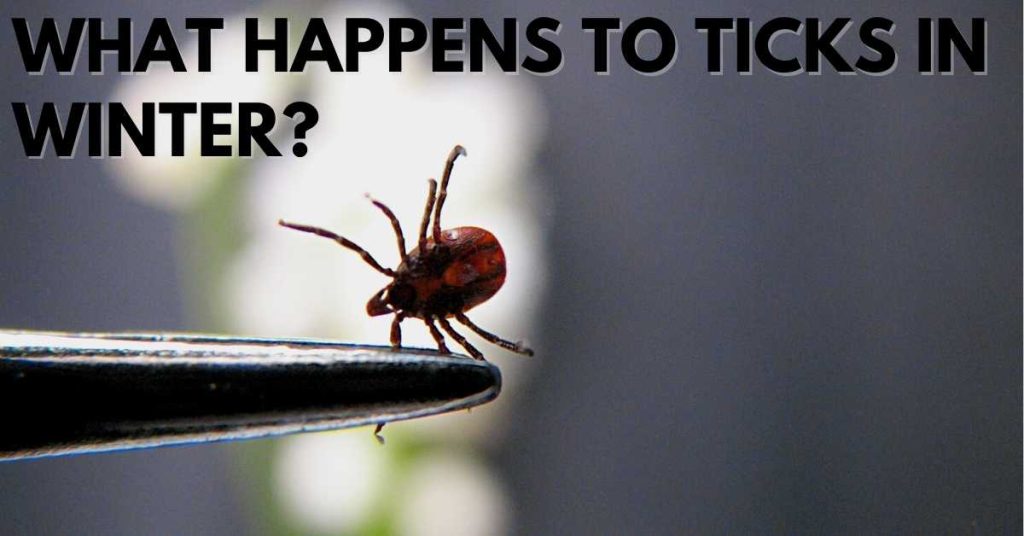
Many think that Ticks die in winter. But they don’t. Ticks remain dormant and manage the cold temperatures by surviving in dead leaves or decaying vegetation. Ticks are parasites that feed on warm-blooded animals (All birds, deer, humans, and others come under this category) by biting them. When a tick bites humans and animals, it causes bacteria, viruses, and protozoa leading to threatening diseases.
Ticks have a flat and oval body. They are like spiders as they have eight legs. They are significantly small in size. So it is hard to spot them, but their body swells when they eat. This blog will help you understand what happens to ticks in winter, their survival possibilities, and how to prevent tick bites in winter.
What Are The Types of Ticks Active In Cold weather?
BlackLegged Ticks
Do all ticks live in winter? Only the black-legged ticks will be active in winter. They are parasitic animals that cannot jump or fly. They climb on vegetation like grasses or shrubs and wait for a host to rub against them. When an animal touches this grass or shrub, these black-legged ticks do the following things. One is climbing on the host body, and the second is attaching to them and starting feeding.
Blacklegged ticks attach their mouthparts to the skin of an animal and drink the blood very slowly over days. Generally, a tick bite is painless. As we know, their bodies expand to accommodate the blood when they feed. It is known as engorgement.
If this black-legged tick has a tick-borne disease, it can pass this infection to its host during feeding. These tick-borne diseases generally circulate between black-legged ticks and wild animals. Animals like rodents, small mammals, and white-tailed deer are the source of the tick-borne disease-causing agents, and the black-legged ticks are the vehicle that carries agents between animals.
Wild animals do not feel any illness from these agents, and also they do not become infected with the tick-borne disease by consuming meat or handling the pelt from a wild animal. But these affected ticks will transfer to you when you come closer to these animals. People and domestic animals are some accidental hosts, and they will be exposed to the disease-causing agent and become ill.
Adult black-legged ticks cannot find a host to feed on in the fall. It goes to a resting phase during low temperatures. Sometimes, even during the winter months, the air temperature rises to 4℃. In this stage, adult black-legged ticks become active again and start their search for animals.
What Do The Ticks Do In Warm Winters?
- Like humans, ticks also love warm winters. When temperatures are warm enough, ticks do not hibernate. They will stay active. Ticks use the warm winter as an opportunity to breed. Thus the chance of pets and people picking up ticks increases.
- Research says that insects carrying a disease can survive cold or warm winters more than their uninfected peers. Ticks increase their activity in warmer winter conditions.
- In the warm winter months of the U.S., ticks expand their reach with Borrelia burgdorferi, the microbe that causes Lyme disease. They emerge during the initial stages of spring and stay up to the last stages of fall. At this time, they interact with humans, bite them, and spread diseases. So, if it is warm winter weather and you plan to spend more time outside, you need to keep ticks top of mind.
- The increase in temperature in the winter month may increase the chances of survival of ticks. If any ticks (in the adult stage) bites you in winter, there are more chances for you to get Lyme Disease.
- Once you reach home after spending time outdoors, it is essential to do a tick check and remove it as they take at least 24 but closer to 36 hours to infect humans and pets.
Do The Ticks Survive In Winter?
Yes, ticks do not die in winter. Ticks survive the winter in many ways. They leave the place just because it is cold. They just become dormant or inactive.
- Ticks will die in winter only when it gets colder. In winter, they shelter in dead leaves, rotting wood, and decomposing vegetation.
- Generally, these ticks ride out the cold weather months by latching onto a host (a deer, cow, elk, or horse). They will not typically latch onto humans during these seasons. Ticks survive the winter months by going dormant or latching onto a host, depending on the species and stage in their life cycle.
- Ticks survive the winter by hiding in leaf litter. The leaves give them enough warmth to last and insulate them from the snow throughout the cold winters.
- If the temperature warms up, these ticks use this chance to come out and start searching for a host.
Do Ticks Die At A Specific Temperature?
- A study was conducted to find the effects of temperature, humidity, and drying time on killing nymphal and adult black-legged ticks.
- They used muslin bags containing five ticks and washed these bags at different water temperatures.
- When the water temperature was at 15-27°C (59-80°F), it did not kill any ticks.
- When the water temperature was near 54°C, it killed 50% of ticks.
- When the water temperature was greater than 54°C (≥130°F), it killed all nymphal and adult ticks.
- When they dried the pack in a heat setting [54-85°C (129-185°F)], it took 50 minutes to kill all ticks.
According to a lab study, the ticks will die between -2 to 14 degrees Fahrenheit in colder winters.
How Do You Prevent Tick Bites In Winter?
Ticks are active in all seasons of the year, even in winter. Follow this list of instructions to prevent yourself from ticks in winter.
- Use insect repellent on exposed skin and clothing. Also, treat clothing like pants, socks, and shoes with appropriate chemicals after use.
- Try to wear light-colored clothing so that you can spot ticks more easily.
- Wear long pants and a long-sleeved shirt tucked into pants, and a hat to add protection.
- Concentrate on walking in the center of trails. Thus you can avoid overhanging branches, grass, and brush.
- Avoid touching tick-infested areas like grass, shrubs, and leaves.
- Once you reach home, remove clothing and wash it at a high temperature.
- Inspect the body of your pet for ticks. They may get Lyme Disease and other tick-borne illnesses.
- Take a bath within two hours of being outdoors to help rid your body of ticks.
- Tick lives in tall grass and heavily wooded areas that protect them from the intense UV rays. So it is necessary to clean your surroundings regularly and rake up old leaves and pine needles.
- If you find any tick in your body, remove that before 36 hours to prevent you from Lyme disease. Never wait to remove it. Use fine-tipped tweezers and slowly grab and pull it away. Then sanitize the particular area with sanitizer.
Dormancy Of Ticks In Winter
Ticks shelter in dead leaves, rotting wood, and decomposing vegetation and go into dormancy when the temperature falls below 35 degrees. Some ticks will die when the temperature reduces below 14 degrees. They can survive long periods without feeding. Each tick species has different survival rates depending on the life stages.
Conclusion
Many believe that ticks, the parasites, cannot survive the winter. They are active in summer, spring and winter too. You can take preventive methods to prevent yourself from tick bites. If the temperature is above the freezing point, ticks like black-legged ticks may be active. Be alert to keep them away as they carry many diseases and transmit to people and animals.


